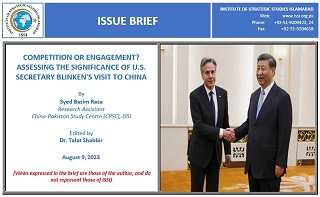Given the current global landscape and its changing dynamics, U.S.-China engagement holds huge significance. The relationship between the two major powers carries significant implications for international peace, security, and economic stability. In the backdrop of increasing tensions and deterioration of relations over the past years, the need for diplomatic engagement between these two major powers became paramount as it incentivizes dialogue promotion and cooperation on key points of contention such as trade, security, climate change, and human rights. Effective diplomatic engagement between the U.S. and China can help prevent conflicts, mitigate risks, and produce outcomes that are mutually beneficial for both countries as well as the international community. In the wake of mounting tensions, U.S. Secretary of State Antony Blinken’s visit to Beijing, which he concluded on 19 June 2023[1], assumed high importance as it was the first visit by a top-level U.S. diplomat to China in almost half a decade.
During recent years, U.S.-China relations have witnessed palpable deterioration, touching new lows each year– particularly illustrated by spike in tensions owing to territorial disputes in South China sea, Taiwan Strait issue, cyber espionage allegations, trade imbalances, human rights concerns, and ideological differences.[2] Reinforced by broader geopolitical ‘competition’, the aforementioned factors created an immediate need for diplomatic efforts to address the points of contention so as to stabilize the relationship.















